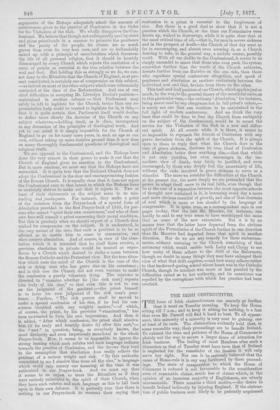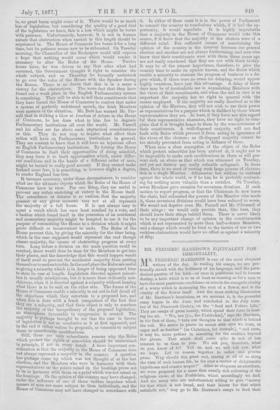THE IRISH OBSTRUCTIVES. T HE force of Irish obstructiveness can scarcely
go further than it went on Tuesday morning. To keep the House sitting till 7 a.m., and to keep it sitting for nothing, is a feat that even Mr. Parnell will find it hard to beat. To all appear- ance, this minority of a minority is very near to gaining one at least of its ends. The obstructives evidently hold that, in some recondite way, their proceedings are to benefit Ireland. To exhaust the time and patience of the House of Commons is plainly not the way to secure a larger share of attention for Irish business. The feeling of most Members after such a discussion as that of Tuesday must have been that if Ireland is neglected for the remainder of the Session it will only serve her right. Nor can it be seriously believed that the cause of Home-rule is in any way furthered by these proceed- ings. The state of exasperation to which the House of Commons is reduced is not favourable to the consideration even of reasonable claims, much less of claims which, in the opinion of an immense majority of Englishmen, are utterly unreasonable. There remains a third motive,—the desire to benefit Ireland indirectly by injuring England. If the obstruc- tion of public business were likely to be patiently acquiesced
in, no great harm might come of it. There would be so much less of legislation, but considering the quality of a good deal of the legislation we have, this is a loss which might be borne with patience. Unfortunately, however, it is not in human nature that obstruction when carried to this length should be acquiesced in, The House of Commons has borne it for a long time, but its patience seems now to be exhausted. On Tuesday morning, the Chancellor of the Exchequer could still express a hope that nothing would occur which would render it
necessary to alter the Rules of the House. Twelve hours later, he was driven to say that after what bad occurred, the Government thought it right to consider the whole subject, and on Thursday he formally undertook to go over the rules of the House with the Speaker during the Recess. There is no doubt that this is in a sense a victory for the obstructives. The mere fact that they have found out a weak place in the English Parliamentary system is something. They will be able to tell their constituents that they have forced the House of Commons to confess that under a system of perfectly unfettered speech, the Irish Members were masters of the situation. Mr, Butt has warned Mr. Par- nell that in striking a blow at freedom of debate in the House of Commons, he has done what in him lies to degrade Parliamentary institutions all over the world. Mr. Parnell and his allies are far above such Impractical considerations
as this. They do not stop to inquire what effect their action will have on Parliamentary institutions in general. They are content to know that it will have an injurious effect on English Parliamentary institutions. By forcing the House of Commons to limit their opportunities of doing mischief, they may force it to limit opportunities which, under differ- ent conditions and in the hands of a different order of men, might be turned to really good account. If they cannot make Ireland more free, it is something, in however slight a degree, to render England less free. It becomes necessary, under these circumstances, to consider what are the ultimate objects which the Rules of the House of Commons have in view. For one thing, they are useful to prevent any unfair snatching at victory in the House itself. The attendance at debates is so various, that the majority present at any given moment may not at all represent the majority of a full house. It is not always easy to upset a result which has once been reached by a vote, and a faction which found itself in the possession of an accidental and momentary majority might be tempted to use it for the purpose of committing the House to a decision which it might prove difficult or inconvenient to undo. The Rules of the House prevent this, by giving the minority for the time being, which in the case supposed would represent the real though absent majority, the means of obstructing progress at every turn. Long before a division on the main question could be reached, there would thus be time for the Members to get into their places, and the knowledge that this would happen would of itself avail to prevent the accidental majority from putting themselves to useless trouble, In the next place the Rules are useful as giving a minority which is in danger of being oppressed time to state its case at length. Legislation directed against minori- ties is usually mischievous, but it is more than ordinarily mis- chievous, when it is directed against a minority without hearing what there is to be said on the other side. The forms of the House of Commons enable a minority to set out in full detail all the objections which they entertain to a proposed law, and when this is done with a frank recognition of the fact that they are a minority, and that their object is only to convince the majority of the inexpediency of the proposed legislation, an atmosphere favourable to compromise is created. The majority
-8 Perhaps brought to see that the case in favour
of legislation is not so conclusive as it at first appeared, and in the end it either waives its proposals, or consents to subject them to considerable modifications. Still, these are only subordinate reasons why the Rules which protect the rights of minorities should be maintained in principle, if not in every detail. A more important con- sideration is that the majority in the House of Commons does not always represent a majority in the country. A question has perhaps come up which was not thought of at the last election, and the Members who were in harmony with their representatives on the points raised on the hustings prove not to be in harmony with them on a point which was not raised on the hustings. Or the opinion of the country may have changed, under the influence of one of those sudden impulses which masses of men are more subject to than individuals, and the House of Commons may not have changed in accordance with
it. In either of these cases it is in the power of Parliament to commit the country to conclusions which, if it had the op- portunity, it would repudiate. It is highly improbable that a majority in the House of Commons would take this course, if it knew that the majority of the electors were of a different mind. But sufficient means of ascertaining the opinion of the country in the interval between one general election and another are not always forthcoming, and men who know that their constituents were with them three years ago are not easily convinced that they are not with them to-day. It may be of the utmost importance, therefore, to give the country time to make its opinion known, and the Rules which enable a minority to obstruct the progress of business to a de- gree which, if there were no canes for delaying, would appear highly vexatious, have just this advantage. A delay of three days may be of incalculable use in acquainting Members with the views of their constituents, and when the end in view is so important the majority has no right to quarrel with the means employed. If the majority are really deceived as to the opinion of the Electors, they will not wish to use their power as representatives for a purpose which is disliked by those whose representatives they are. At least, if they have not this regard for their representative character, they have no right to com- plain that it is brought home to them by the remonstrances of their constituents. A well-disposed majority will not find fault with Rules which prevent it from acting in ignorance of the views of the electors ; an ill-disposed majority cannot be too strictly prevented from acting in defiance of them.
When once a clear conception of the object of the Rules which protect minorities has been arrived at, it ought not to be impossible to make such modifications in them as will pre- vent such an abuse as that which was witnessed on Tuesday, and yet not destroy any really valuable safeguard. In these days, there is no need. of vesting such large powers of obstruc- tion in a single Member. Athanasius has seldom to contend against the whole world, or if he has, he is probably contend- ing for nothing more valuable than a crotchet. On Tuesday, seven Members gave occasion for seventeen divisions, If each motion to report progress, or that the Chairman do now leave the chair, had exhausted the powers of the Member who made it, these seventeen divisions would have been reduced to seven. We would not deprive even Mr. Parnell and Mr. O'Donnell of their stings ; we would only provide that, like bees, they should leave their stings behind them. There is never likely to be any important change of opinion in the constituencies which is not represented by more than half-a-dozen Members, and a change which would be fatal to the tactics of one or two reckless obstructives would have no effect as against a minority of fifty.



































 Previous page
Previous page